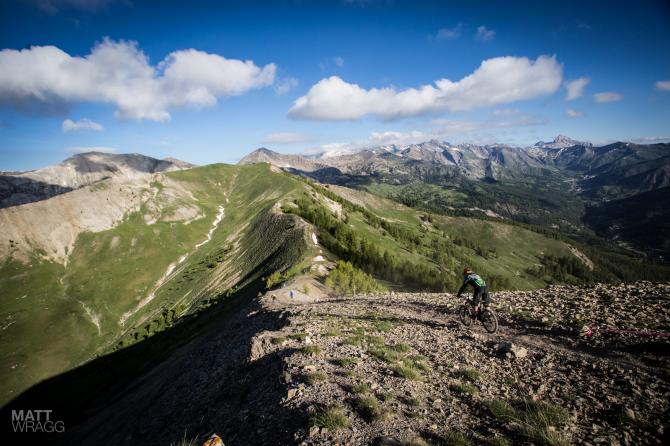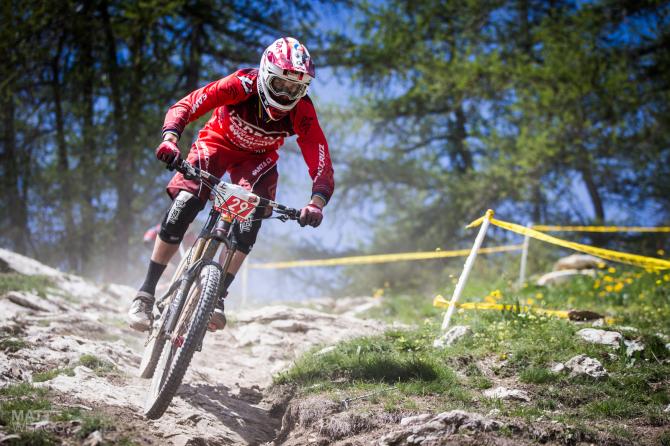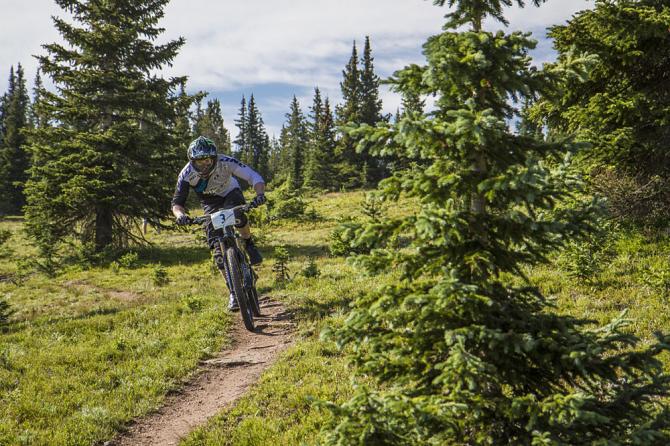Interview: Enduro World Series Founder Chris Ball on the growth of enduros, Part 2
A glimpse into the future of enduro racing



Chris Ball is the promoter of the Enduro World Series (EWS). Marking the continued rapid growth of enduro racing, the EWS held its first season in 2013 and wrapped up last month in Italy. Cyclingnews spoke with the man behind the series about how the EWS came to be, its first year, the growth of the discipline and what to expect with enduro racing in years to come.
Part 1 focused on this year's EWS. Part 2, below, takes a look at UCI involvement in enduros and plans for next year's EWS.
Cyclingnews: What changes are you planning for next year's EWS based on what you learned this season?
Chris Ball: We're going to try to increase the amount of pedalling in the liaisons. The feedback from the riders was that they actually enjoyed the climbs between the stages. Chairlifts work well in certain locations. Where there is a chairlift, we will enhance the course with some more climbing, for both pros and amateurs.
The intervals between top riders will be increased. We were having 15-minute stages come down to within a couple of seconds. The margins are quite tight. We'll have to give the guys more time. Those margins will only get tighter as the sport gets more professionalized. The interval was a minimum 20 seconds, and we'll increase it to a minimum of 30 seconds. At some events, it may be as much as one minute.
We were surprised how close the times of the riders were. I think the riders were surprised as well. We had hoped it would be close racing. I figured it would be closer than a lot of people had thought.
We've learned a lot about how to structure the races so as to create a closer race - how much climbing vs. descending vs. technicality. You need a good balance to keep the race fair and close. Even with that balance, it's been mindblowing how fast they have been going and how close they are to each other.
The latest race content, interviews, features, reviews and expert buying guides, direct to your inbox!
CN: The UCI recently released enduro racing regulations. The first EWS was separate from the UCI after the UCI turned down the chance to launch the international series in house. Do you envision maintaining a separate relationship or taking it back under the UCI sanctioning system?
CB: First and foremost, our goal was to define what enduro was. Even just a year ago, people heard the world enduro and didn't know what it was. There was the idea that it was mass start or super D or that it was a gnarly form of eliminator racing. We wanted to define it as the format it is now: single start, multi-stage, all stages count, wild-style mountain bike racing.
The inclusion of our rules in the UCI rule book is in many ways a great step. In fact, they define enduro like we have. So our goal has been achieved. People understand what enduro is.
We need to learn more about the UCI's long term plans, and we have a meeting with them for early next year to understand where they want to go and what they want to do. Only then can we decide whether we're with them or not.
The fundamental thought for us is that as long as it's the correct direction and decision for the sport and its riders, we'll make it. We want to make sure the sport is developed in the best possible way. At the moment, we're in a position where we are doing that anyway, or at least we hope so. We'll just have to see how that fits into any bigger plans, if there are any.
The rules now are being decided by the guys racing in enduro and organizing it. That needs to remain. We don't want to hand over decisions to a body that is only going to regulate and not be involved and understand. Understanding is a major part.
CN: How do you think UCI classification of enduro racing will affect the discipline?
CB: I think it's great that the UCI's efforts are in line with ours. For any EWS events that are UCI-sanctioned, there are no issues. We're developing enduro in the same way. There is no animosity, nor argument. We've been doing our own thing and focusing on our own tasks. We'll find out if the direction they want to go is the same as ours. We'll have a better understanding after our meeting. As of now, there is no clash, and we're not here to create one. We just want to develop the discipline the best it can be.
CN: Enduro as it is now reminds us of the earlier days of cross country racing. Where do you think the discipline is in its evolution?
CB: I guess the free-forming approach, like currently in enduro, is what you have in an adolescent discipline.
CN: UCI Rule 1.2.019 is the infamous rule that prohibits licensed riders from competing in races not sanctioned by the UCI or national federation. That's been a problem on the cross country side, especially in the US because there are well established big-money races that are unsanctioned. In 2013, the rule was suspended, which meant riders could race unsanctioned enduros or cross countries without any issue. Are you concerned the rule might affect the EWS in 2014, if it is not changed?
CB: In Italy and France, the enduro races are sanctioned, so there is no issue there. Some federations have enduro in their rule books. France and Italy have had enduros for many years as sanctioned events.
Long term, I'm not particularly worried about that rule. It's going to be interesting to see how the UCI wants to handle that. There are ways around it, even in the current rulebook. It's up to the federations to install it where it needs to be installed and not where it doesn't.
You could argue there is more at stake in cross country due to the Olympics and therefore more is at stake for rider development and rider pathways.
Enduro is more of a rider-focused discipline and I would be very against any heavy-handed approach to implementing a rule like that. I think it goes against any form of participation-oriented sport.
The rule doesn't concern me in the immediate future, and I'd like to think we'd be able to work on a solution.
CN: What about the enduro races in North America?
Crankworks isn't sanctioned - neither in Colorado nor Whistler. We're kind of saying that when we work with the organizers, we realize that what works in a region works in that region for a reason. If in North America, it's better for an enduro event not to be sanctioned traditionally, but it's a high level, professional event, we see no reason to force them into sanctioning.
Whereas in Europe, there is a history behind sanctioning and a more supportive federations behind enduro, perhaps it makes more sense for those to be sanctioned.
It comes down to regional differences and cultures. The cultures across the Atlantic are so much different We need to allow the sport to grow.
In North America, some promoters are reluctant to go the sanctioning route because they are afraid of cutting of participation by those who do not have licenses, like many amateurs, who come out to do the event for fun. They may not want to buy into a structure or system they don't otherwise have to buy into to race most weekends.
I think it comes down to for some disciplines, there are different motivations and kinds of participation. For participation-based disciplines, it might be different than for an Olympic sport. Maybe there needs to be different ways.
CN: Are there any plans to expand the coverage for the EWS in 2014, like for example, TV or more video?
CB: We're working on that for next year. We're pleased with feedback this year. There is a cost vs. income barrier, but we're doing our best to improve our coverage. This year was good so far, and we'll just continue to step up each year.
It's not an easy discipline to cover. I guess that's why it's so good to race in. The trails that are the best to cover often aren't the best to ride. We'll leave the televisual decision to cross country, and downhill and we'll focus the enduro on the riders. It's a difficult balance.
Look at the effect that televising the downhill and cross country has had on the courses. Many people aren't interested in riding laps around courses - many want the experience to be more adventurous. Hence the popularity of marathon races, enduros and stage races.
From a rider perspective, good television tends to mean a worse riding experience. You look at cross country moving more toward the cyclo-cross model of shorter laps and better for spectators, that's a a great development from a global audience perspective. It's the same for downhill. The more those World Cup disciplines move in that direction, the further they move from what you and I would do on our mountain bikes on the weekend.
Maybe that's why we've had so much traction so quickly. People can identify with the enduro because it's what people do on the bike. I hope we can retain that. The more successful our racing, the more people will want to see it and we may have to make it more visible, but we want to keep it more mountain bike focused.
At the same time the growth of the sport will try to push it in another direction. We'll have to balance the decisions on all fronts. We don't have have to have three mountain bike disciplines all vying for TV coverage, do we?
I fully believe that disciplines like downhill have to keep going the way they are going.
CN: It seems like downhill racing and even cross country racing just keeps getting more extreme. The courses get more extreme and it may be increasingly hard for average riders to relate to riding those courses.
CB: It's the professionalization of those disciplines and the televising for the audience driving that. For example, you might own a motorcycle, but not race super cross. Super cross is a fan-based sport, for people to watch. That's more where downhill is heading. It's spectacular to watch. I loved watching downhill this year. But then I would go out and ride an enduro race.
Read Part 1 of this interview.
"It's not an easy discipline to cover. I guess that's why it's so good to race in. The trails that are the best to cover often aren't the best to ride. We'll leave the televisual decision to cross country, and downhill and we'll focus the enduro on the riders. It's a difficult balance." - Chris Ball, Founder of the Enduro World Series
Sue George is an editor at Cyclingnews. She coordinates all of the site's mountain bike race coverage and assists with the road, 'cross and track coverage.